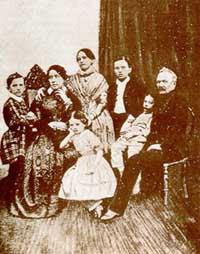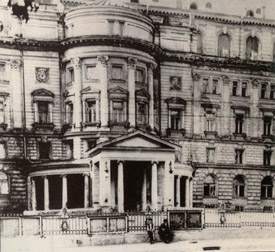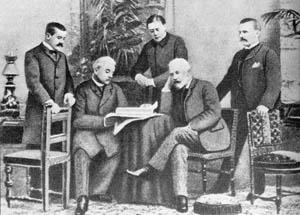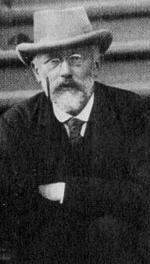Composer (MIDI)
Pyotr Il′yich Tchaikovsky (1840-1893); RUS
 Loading, please wait...
Loading, please wait...
The memorable melodies, strong colors and uninhibited emotionalism of Pyotr Il'yich Tchaikovsky have long made him one of the most widely popular of all composers. These same qualities have also perhaps made it harder for some critics and professionals to fully appreciate Tchaikovsky's originality and accomplishments. In these biographical essays it has been noted how the opera is at the core of Mozart and the lied is central to Schubert. With Tchaikovsky, his essence is in many ways the idealized fairy tale world of the classic ballet, and this colorful and dramatic spirit pervades much of his music, including the great symphonies.
 Pyotr Il'yich Tchaikovsky was born to a middle class family in Votkinsk, Russia in 1840. Like Schumann, a composer who had a strong influence on him, Tchaikovsky dutifully studied law before following his true calling by entering the St. Petersburg Conservatory where he studied from 1863 to 1865. Among his teachers was Anton Rubinstein with whom he studied composition. In 1866 he went to Moscow to become the professor of harmony at the new conservatory headed by Nicholas Rubinstein (Anton's brother). In his first two years, he wrote his first symphony (Winter Daydreams) and first opera (Voyevod).
Pyotr Il'yich Tchaikovsky was born to a middle class family in Votkinsk, Russia in 1840. Like Schumann, a composer who had a strong influence on him, Tchaikovsky dutifully studied law before following his true calling by entering the St. Petersburg Conservatory where he studied from 1863 to 1865. Among his teachers was Anton Rubinstein with whom he studied composition. In 1866 he went to Moscow to become the professor of harmony at the new conservatory headed by Nicholas Rubinstein (Anton's brother). In his first two years, he wrote his first symphony (Winter Daydreams) and first opera (Voyevod).
At the conservatory, Tchaikovsky became acquainted with the group of Russian composers headed by Rimsky-Korsakov and Balakierev whose nationalist passions inspired his second symphony (Little Russian). Tchaikovsky was later rejected by this group for being too conservatory trained, cosmopolitan and not sufficiently Russian. In fact, Tchaikovsky's music, while ultimately deeply Russian, is also imbued with his love of Mozart and other western European influences, particularly the French music of Bizet and Saint-Saëns. But as Stravinsky wrote, "Tchaikovsky's music, which does not appear specifically Russian to everybody, is more often profoundly Russian than music which has long since been awarded the facile label of Muscovite picturesqueness. This music is quite as Russian as Pushkin's verse or Glinka's song... Tchaikovsky drew unconsciously from the the true, popular sources of our race."
From 1869 to 1876, Tchaikovsky wrote three more operas, and the Piano Concerto No. 1 in Bb- (1st movement). He was also the music critic of "Russikye vedomosti," and this took him to the first Bayreuth festival in 1876, although Wagner's music meant nothing to him. Nor did Brahms' for that matter. "It angers me that that presumptuous mediocrity  is recognized as a genius." Regarding Beethoven, "I acknowledge the greatness of some of his works, but I do not love him." Mozart however, was "a musical Christ." Meanwhile the piano concerto was premiered by Van Bulow in Boston after being rejected with scathing criticism by Nicholas Rubinstein. The reviews called it an "extremely difficult, strange wild, ultra-Russian concerto", and asked, "Could we ever learn to love such music?"
is recognized as a genius." Regarding Beethoven, "I acknowledge the greatness of some of his works, but I do not love him." Mozart however, was "a musical Christ." Meanwhile the piano concerto was premiered by Van Bulow in Boston after being rejected with scathing criticism by Nicholas Rubinstein. The reviews called it an "extremely difficult, strange wild, ultra-Russian concerto", and asked, "Could we ever learn to love such music?"
In 1877, Tchaikovsky made the disastrous mistake of marrying one of his pupils, Antonina Ivanova Miliukova. Tchaikovsky was a hyperemotional, unhappy and secretive homosexual hoping that a respectable marriage with a hero worshipping student would be a workable solution to his plight. Unfortunately he chose a woman who was not only not bright, but a nymphomaniac as well. The marriage lasted nine weeks culminating in Tchaikovsky attempting suicide by jumping in a river to give himself pneumonia (again reminiscent of Schumann). His brother Modest, also homosexual, saved him and took him back to St Petersburg where Tchaikovsky suffered a complete nervous breakdown.
About this time Tchaikovsky started a relationship with a wealthy widow, Nadejda von Meck, who became his patron for the next fourteen years. She was forty-six and the mother of seven. She offered to subsidize Tchaikovsky with the proviso that they never meet. During their voluminous correspondence she wrote, "...I fear your acquaintanceship. I prefer to think of you from afar, to hear you speak in your music and share your feelings through it." This of course was a perfect situation for the morbidly shy composer who wrote back, "You are afraid you will fail to find in my personality all those qualities with which your idealizing imagination has endowed me.  And in that you are quite right." When they once met face to face at a concert, not a word was spoken as they turned away in embarrassment.
And in that you are quite right." When they once met face to face at a concert, not a word was spoken as they turned away in embarrassment.
This unusual relationship along with increasing commissions allowed Tchaikovsky to resign from teaching and to live a comfortable life, replete with various country homes. His elegant lifestyle did not relieve him of his emotional problems however, and he continued to suffer from headaches, was often overcome with weeping, and drank too much. In his diary he wrote, "It is said that to abuse one's self with alcohol is harmful. I readily agree to that. But nevertheless I, a sick person, full of neuroses, absolutely cannot do without the alcoholic poison."
When Nadja terminated their relationship suddenly in 1890 because of her own fears about going bankrupt, Tchaikovsky was devastated. She refused to answer his letters and consequently all his faith in humankind "have been overturned." Unknown to Tchaikovsky, Nadja was suffering from her own bout of mental instability. Tchaikovsky left for New York in 1891 to share in the opening ceremonies for Carnegie Hall. America fascinated him, but he wrote, "I enjoy all this like a person sitting at a table set with marvels of gastronomy, devoid of appetite." In 1892, he heard Mahler conduct his Pushkin opera, "Eugene Onegin" (Entr'acte and Waltz, Polonaise) in Hamburg.
 Back in Russia, Tchaikovsky wrote the beloved Nutcracker Suite (1.Miniature Overture, 2.March, 3.Dance of the Sugar Plum Fairy, 4.Trepak, 5.Arab Dance, 6.Danse Chinoise, 8.Waltz of the flowers), completed in 1892, and began work on his programmatic Sixth Symphony, ultimately called the "Pathétique" (3.Allegro molto vivace), into which he "put his soul." Within a week after the premiere in St. Petersburg in 1893, he was dead, supposedly from cholera contracted from drinking unboiled water, perhaps intentionally. There is also some credence given to the theory that he may have been poisoned to prevent revelation of a homosexual scandal involving the aristocracy.
Back in Russia, Tchaikovsky wrote the beloved Nutcracker Suite (1.Miniature Overture, 2.March, 3.Dance of the Sugar Plum Fairy, 4.Trepak, 5.Arab Dance, 6.Danse Chinoise, 8.Waltz of the flowers), completed in 1892, and began work on his programmatic Sixth Symphony, ultimately called the "Pathétique" (3.Allegro molto vivace), into which he "put his soul." Within a week after the premiere in St. Petersburg in 1893, he was dead, supposedly from cholera contracted from drinking unboiled water, perhaps intentionally. There is also some credence given to the theory that he may have been poisoned to prevent revelation of a homosexual scandal involving the aristocracy.
The emotional temperature in Tchaikovsky's music is high and in theforeground, but unlike some of his Russian contemporaries, he struggled very consciously to find lucid forms for his thoughts. The final three symphonies (Symphony No.4: 4th movement; Symphony No.5: 3rd movement) are the ultimate success of this search, culminating in the brilliant and unorthodox solution of ending the sixth symphony with an extended slow movement that releases and extinguishes all the energies of the brilliant preceding march movement.
Tchaikovsky, along with Brahms, is probably the most performed of the late 19th century composers. In addition to the symphonies and orchestral favorites such as the various concertos for piano, violin (Violin Concerto: 1st Movement) , and cello (the Rococo Variations), there are also "Romeo and Juliet" (Overture), the "1812 Overture," and "Capriccio Italien."
"Eugene Onegin" and the "Queen of Spades" are regularly performed at opera houses, and the "Sleeping Beauty" (Waltz) , "Swan Lake" (2.Waltz; 3.Dance of the four little swans), and "Nutcracker" ballets are universally part of the culture. Beautiful but less well known, are the three string quartets (Quartet No.1: 2nd movement), the Serenade for Strings (4th Movement), the Ami Piano Trio, works for solo piano, and many fine songs.
Biography by Allen Krantz. Copyright © Classical Archives, LLC. All rights reserved.
###
Tchaikovsky [Chaykovsky], Pyotr (Ilyich) (b Votkinsk, 1840; d St Petersburg, 1893). Russ. composer and conductor. Studied law in St Petersburg. Worked as civil servant and studied 1863-5 at mus. coll. instituted by A. Rubinstein which became St Petersburg Cons. Went to Moscow 1866, becoming prof. of harmony at new Cons. under directorship of N. Rubinstein. During first 2 years there wrote 1st Sym. and opera Voyevoda. In 1868 met nationalist group of young Russ. composers headed by Rimsky-Korsakov and was stirred by their enthusiasm, as is shown by his 2nd Sym., but later came to be regarded by them as cosmopolitan rather than truly Russ. From 1869 to 1875 wrote 3 more operas and first pf. conc. and was mus. critic of Russkiye vedomosti 1872-6, going to first Bayreuth Fest. 1876. In 1877 married one of his pupils, separating from her 9 weeks later, attempting suicide, and coming near to mental collapse, psychological result of fatal step for a man of homosexual tendencies. At this time was taken under patronage of wealthy widow, Nadezhda von Meck, who out of admiration gave him yearly allowance which enabled him to abandon teaching and devote himself wholly to comp. She and Tchaikovsky never spoke to each other, though they corresponded voluminously. Fourth Sym. is ded. to her. Went to Switz. and It., composing opera Eugene Onegin, prod. by students of Moscow Cons. 1879, with moderate success. By 1880, his works were popular in Russia (thanks to advocacy of N. Rubinstein), and in Brit. and USA but still met with hostility in Paris and Vienna. In 1885 bought country house, first of several, at Klin, living in hermit-like isolation. There, wrote Manfred and in 1887 made début in Moscow as cond. of rev. version of opera Vakula the Smith under title Cherevichki (The Slippers). In 1888 toured Ger., Fr., and London as cond., returning to Ger. and Eng. in 1889. Ballet Sleeping Beauty prod. 1890, after which Tchaikovsky went to Florence to work on opera Queen of Spades, prod. St Petersburg 1890. Year ended with sudden rupture of relationship with Mme von Meck; illness (or the disapproval by her family of her patronage of Tchaikovsky) had dictated her decision, which wounded Tchaikovsky deeply. Visited USA with great success 1891, and in Jan. 1892 heard Mahler conduct Eugene Onegin at Hamburg. Ballet Nutcracker comp. 1891-2, as double bill with opera Yolanta, and work started on a 6th Sym. In that year, again visited Vienna and in 1893 went to Eng., where hon. doctorate of mus. was conferred on him by Cambridge Univ. During 1893 wrote 6th Sym., having abandoned sym. begun in 1891-2 and re-worked it as a 3rd pf. conc., eventually retaining only one movt. (2nd and 3rd orch. from the surviving sketches by Taneyev after Tchaikovsky's death). F.p. of the sym. was only moderately successful, though Tchaikovsky was convinced it was his best work. It is usually stated that 4 days later he felt ill and drank a large glassful of unboiled water (possibly with deliberate intent) and developed cholera, which led to his death. But in 1979 the Russian scholar Alexandra Orlova published a theory that the composer's death was suicide by poison, ordered by a private court of his former law-student colleagues to prevent revelation of a homosexual scandal involving the aristocracy. This theory is violently opposed by some scholars and the matter remains controversial and unresolved.
Few composers are more popular with audiences than Tchaikovsky; the reasons are several and understandable. His music is extremely tuneful, luxuriously and colourfully scored, and filled with emotional fervour directed to the heart rather than to the head (though the notion that Tchaikovsky's syms. are lacking in symphonic thinking and structure does not bear serious consideration). Undoubtedly the emotional temperature of the mus. reflected the man's nature. He was doubly afflicted: by repressed homosexuality (hence his disastrous attempt at marriage) and by the tendency to extreme fluctuations between elation and depression, each success being followed by a period of introspective gloom and melancholy which stemmed from psychological defects rather than from ‘typical Russian melancholy’. This showed itself also in his attitude to his visits abroad. As soon as he left Russia he was ill with homesickness; once back, he was restlessly planning to be off again.
In 19th-cent. Russ. mus., Tchaikovsky stands alone. His Romeo and Juliet was ded. to Balakirev, one of the ‘Five’, but he never identified himself with out-and-out nationalism. He succumbed to the influence of neither Brahms nor Wagner, but greatly admired the Fr. mus. of Bizet and Saint-Saëns. This can be linked with his lifelong passion for Mozart, and many passages in Tchaikovsky's mus. are as delicately detailed and coloured as works by Bizet and Mozart. The other element of his nature, the fate-laden, Byronic, emotional impact of the last 3 syms., is traceable in many episodes in the operas, notably Eugene Onegin. None of his operas was a success on its first appearance, but Onegin and Queen of Spades are now widely perf. and admired, and adventurous cos. have explored the others. The true theatrical Tchaikovsky is to be found in the ballets, a supreme combination of melodic inventiveness, grand sweep, and constant freshness. Nor should the superb songs be forgotten: in them, in miniature, the soul of Tchaikovsky is enshrined as surely as in the great syms., concs., and orch. masterpieces. Prin. works:
OPERAS: Voyevoda, Op.3 (Dream on the Volga) (1867-8); Undine (destroyed) (1869); Oprichnik (The Life Guardsman) (1870-2); Vakula the Smith, Op.14 (Kuznets Vakula) (1874, rev. 1885 and 1886 as Cherevichki (The Slippers) or Oxana's Caprice); Eugene Onegin (Evgeny Onyegin), Op.24 (1877-8); The Maid of Orleans (Orleanskaya Deva) (1878-9, rev. 1882); Mazeppa (1881-3); The Sorceress (Charodeyka) (1885-7); Queen of Spades (Pikovaya Dama), Op.68 (1890); Yolanta, Op.69 (1891).
BALLETS: Swan Lake (Lebedinoye ozero), Op.20 (1875-6); The Sleeping Beauty (Spyashchaya krasavitsa), Op.66 (1888-9); Nutcracker (Shchelkunchik), Op.71 (1891-2).
ORCH.: syms.: No.1 in G minor, Op.13 (Winter Daydreams) (1866, rev. 1874), No.2 in C minor, Op.17 (Ukrainian or Little Russian) (1872, rev. 1879-80), No.3 in D, Op.29 (Polish) (1875), No.4 in F minor, Op.36 (1877-8), No.5 in E minor, Op.64 (1888), No.6 in B minor, Op.74 (Pathetic) (1893); concertos, etc.: pf.: No.1 in Bb minor, Op.23 (1874-5), No.2 in G, Op.44 (1879-80, rev. 1893 Ziloti), Concert Fantasy, Op.56 (1884); vn. conc. in D, Op.35 (1878), Sérénade mélancolique, vn., Op.26 (1875), Valse-Scherzo, vn., Op.34 (1877); Variations on a Rococo Theme, vc., Op.33 (1876), Pezzo capriccioso, vc., Op.62 (1887); symphonic fantasies: The Tempest, Op.18 (1873), Francesca da Rimini, Op.32 (1876); Slavonic March, Op.31 (1876); Serenade, str., Op.48 (1880); 1812, Ceremonial Overture, Op.49 (1880); Manfred Symphony, Op.58 (1885); ov., The Storm, Op.76 (1864); sym.-poem Fate, Op.77 (1868); fantasy ovs.: Hamlet, Op.67a (1888), Romeo and Juliet (1869, rev. 1870 and 1880); Italian Caprice, Op.45 (1880); symphonic ballad, Voyevoda, Op.78 (1891); Suites: No.1 in D, Op.43 (1878-9), No.2 in C, Op.53 (1883), No.3 in G, Op.55 (1884, Theme and Variations movt. often perf. separately), No.4 Mozartiana, Op.61 (1887), Nutcracker, Op.71a (1892). (N.B. The ‘Sym. No.7 in Eb’ and the ‘Pf. Conc. No.3 in Eb’ are compilations by other hands. The sym. was begun by Tchaikovsky in 1891-2, but abandoned. He scored 1st movt. as pf. conc., Taneyev later adding andante and finale from sketches of the sym. S. Bogatyryov (1890-1960) prod. perf. version of orig. sym. from same sketches. Taneyev also completed vocal duet version (1893) of part of Romeo and Juliet ov. for sop., ten., and orch.)
CHAMBER MUSIC: str. qts.: No.1 in D, Op.11 (contains Andante cantabile often played separately) (1871), No.2 in F, Op.22 (1874), No.3 in Eb minor, Op.30 (1876); pf. trio in A minor (in memory of a great artist), Op.50 (1881-2); Souvenir de Florence, str. sextet, Op.70 (1887-90, rev. 1891-2).
PIANO: Valse Caprice, Op.4 (1868); Capriccio, Op.8 (1870); 3 Pieces, Op.9 (1870); Nocturne and Humoreske, Op.10 (1871); 6 Pieces, Op.19 (1873); 6 Pieces on One Theme, Op.21 (1873); sonata in G, Op.37 (1878); The Seasons, 12 characteristic pieces (1875-6); Children's Album: 24 Pieces, Op.39 (1878); 12 Pieces, Op.40 (1878); 6 Pieces, Op.51 (1882); Dumka, Op.59 (1886); 18 Pieces, Op.72 (1893; the 10th of these, Scherzo-Fantaisie in Eb minor, exists in orch. sketch of 1891-2 and is presumed to have been intended as scherzo of projected sym. Incorporated by Bogatyryov in ‘7th Sym.’, see above); Sonata in C# minor (posth.).
CHORAL: Liturgy of St John Chrysostom, Op.41 (1878); Russian Vesper Service, unacc., Op.52 (1881-2).
SONGS: Tchaikovsky's songs were pubd. in the following groups (no. of songs, Op.no. and date): 6, Op.6, 1869; 6, Op.16, 1872; 6, Op.25, 1874; 6, Op.27, 1874; 6, Op.28, 1874; 6, Op.38, 1877; 7, Op.47, 1879; 16 for children, Op.54, 1883; 6, Op.57, 1883; 12, Op.60, 1886; 6, Op.63, 1888; 6, Op.65, 1888; 6, Op.73, 1893. Among the best-known are: Again as before; As they kept on saying; At the ball; Behind the window; Cradle Song; Deception; Don Juan's Serenade; Evening; Exploit; In the early Spring; My spoiled darling; Night; No, only he who has known (None but the lonely heart) (Op.6 No.6); Not a word, my friend; Over the golden cornfields; Reconciliation; To forget so soon; Wait; Why did I dream of you?
Copyright © 1996 Oxford University Press - By permission of Oxford University Press
###
Read biography at allmusic.com.

|
The memorable melodies, strong colors and uninhibited emotionalism of Pyotr Il'yich Tchaikovsky have long made him one of the most... More
|
-
Stage Works
43 midis
- Ballets
39 midis
- Nutcracker (ballet), Op.71
2 midis
- The Sleeping Beauty (ballet), Op.66
2 midis
- The Swan Lake (ballet), Op.20
35 midis
- Nutcracker (ballet), Op.71
-
Operas
4 midis
- Eugene Onegin (opera), Op.24
4 midis
- Eugene Onegin (opera), Op.24
- Ballets
-
Orchestral Works
137 midis
- Concertos and Similar Works
17 midis
- Pezzo capriccioso in B-, for cello and orchestra, Op.62
1 midi
- Piano Concerto No.1 in Bb-, Op.23
11 midis
- Sérénade mélancolique, for violin and orchestra in B-, Op.26, TH56
1 midi
- Variations on a Rococo Theme, for cello and orchestra (or cello and piano) in A, Op.33
1 midi
- Violin Concerto in D, Op.35
3 midis
- Pezzo capriccioso in B-, for cello and orchestra, Op.62
-
Symphonies
34 midis
- Manfred Symphony in B-, Op.58
1 midi
- Symphony No.1 in G- , Op.13 ('Winter Dreams')
3 midis
- Symphony No.2 in C-, Op.17 ('Little Russian')
4 midis
- Symphony No.3 in D, Op.29 ('Polish')
5 midis
- Symphony No.4 in F-, Op.36
12 midis
- Symphony No.5 in E-, Op.64
5 midis
- Symphony No.6 in B-, Op.74 ('Pathétique')
4 midis
- Manfred Symphony in B-, Op.58
-
Orchestral Suites
64 midis
-
Other Orchestral Works
22 midis
- Concertos and Similar Works
-
Piano Works
48 midis
- Children's Album: 24 Easy Pieces, Op.39
28 midis
- 2 Morceaux, Op.10
1 midi
- 6 Morceaux composés sur un seul thème, Op.21
1 midi
- 12 Morceaux, difficulté moyen, Op.40
4 midis
- 6 Morceaux, Op.51
1 midi
- Romance in F-, Op.5
1 midi
- Souvenir de Hapsal, Op.2
1 midi
- The Seasons, Op.37b
11 midis
- Children's Album: 24 Easy Pieces, Op.39
-
Chamber Works
5 midis
- String Quartet No.1 in D, Op.11
5 midis
- String Quartet No.1 in D, Op.11
-
Vocal Works
6 midis
- Choral Works
3 midis
- Nightingale
1 midi
- 9 Sacred Pieces
2 midis
- Nightingale
-
Songs
3 midis
- 16 Children's Songs, Op.54
1 midi
- 7 Romances, Op.47
1 midi
- 6 Romances, Op.6
1 midi
- 16 Children's Songs, Op.54
- Choral Works
-
Stage Works
43 midis
- Ballets
39 midis
- Nutcracker (ballet), Op.71
2 midis
- The Sleeping Beauty (ballet), Op.66
2 midis
- The Swan Lake (ballet), Op.20
35 midis
- Nutcracker (ballet), Op.71
-
Operas
4 midis
- Eugene Onegin (opera), Op.24
4 midis
- Eugene Onegin (opera), Op.24
- Ballets
-
Orchestral Works
137 midis
- Concertos and Similar Works
17 midis
- Pezzo capriccioso in B-, for cello and orchestra, Op.62
1 midi
- Piano Concerto No.1 in Bb-, Op.23
11 midis
- Sérénade mélancolique, for violin and orchestra in B-, Op.26, TH56
1 midi
- Variations on a Rococo Theme, for cello and orchestra (or cello and piano) in A, Op.33
1 midi
- Violin Concerto in D, Op.35
3 midis
- Pezzo capriccioso in B-, for cello and orchestra, Op.62
-
Symphonies
34 midis
- Manfred Symphony in B-, Op.58
1 midi
- Symphony No.1 in G- , Op.13 ('Winter Dreams')
3 midis
- Symphony No.2 in C-, Op.17 ('Little Russian')
4 midis
- Symphony No.3 in D, Op.29 ('Polish')
5 midis
- Symphony No.4 in F-, Op.36
12 midis
- Symphony No.5 in E-, Op.64
5 midis
- Symphony No.6 in B-, Op.74 ('Pathétique')
4 midis
- Manfred Symphony in B-, Op.58
-
Orchestral Suites
64 midis
-
Other Orchestral Works
22 midis
- Concertos and Similar Works
-
Piano Works
48 midis
- Children's Album: 24 Easy Pieces, Op.39
28 midis
- 2 Morceaux, Op.10
1 midi
- 6 Morceaux composés sur un seul thème, Op.21
1 midi
- 12 Morceaux, difficulté moyen, Op.40
4 midis
- 6 Morceaux, Op.51
1 midi
- Romance in F-, Op.5
1 midi
- Souvenir de Hapsal, Op.2
1 midi
- The Seasons, Op.37b
11 midis
- Children's Album: 24 Easy Pieces, Op.39
-
Chamber Works
5 midis
- String Quartet No.1 in D, Op.11
5 midis
- String Quartet No.1 in D, Op.11
-
Vocal Works
6 midis
- Choral Works
3 midis
- Nightingale
1 midi
- 9 Sacred Pieces
2 midis
- Nightingale
-
Songs
3 midis
- 16 Children's Songs, Op.54
1 midi
- 7 Romances, Op.47
1 midi
- 6 Romances, Op.6
1 midi
- 16 Children's Songs, Op.54
- Choral Works









 Files of this type are not available at this time. Please select ALL from above.
Files of this type are not available at this time. Please select ALL from above.
 Click on a category to view the list of works
Click on a category to view the list of works


